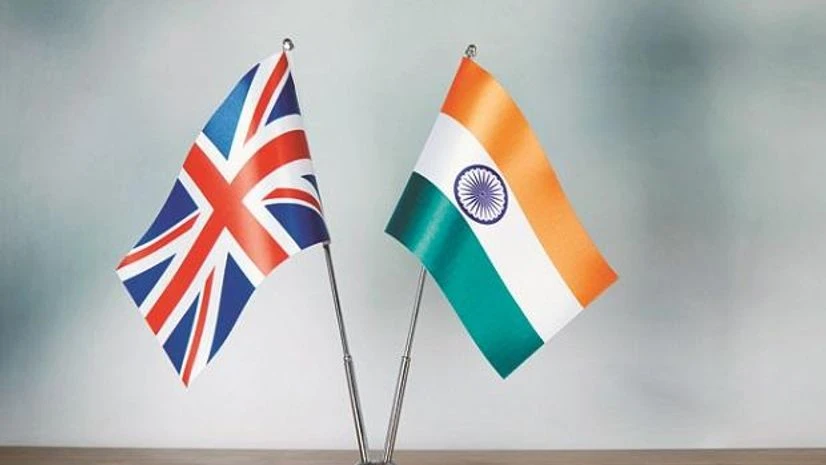New Delhi [India] December 19 (ANI) Intellectual Property (IP) protection and enforcement, standards, tariffs on several products, and data protection are among the key issues that would dominate the Free Trade Agreement (FTA) talks between India and the United Kingdom (UK), which are set to being early next year.
Talking to ANI, Managing Director of UK India Business Council Kevin McCole said there is a strong political will and desire from the two countries to conclude a comprehensive free trade agreement as soon as possible.
McCole said UK India Business Council has identified key areas of concern of the business community that needs to be addressed during the talks. "During the last summer, we conducted a round table. We engaged with around 200 business leaders. A number of priority areas came up," McCole said in a virtual interview from London.
He said business leaders of both the UK and India want a defined standard of rules for trade and investment. "Having defined standards is very important. If we have a defined standard it will become easier for the Indian companies to export to the UK, and the UK companies to export to India."
McCole said custom procedures and tariff rates on some products, notably, automotive and automotive components and Scotch Whiskey are among the major concerns of UK businesses doing trade with India.
More From This Section
"On automotive components, India increased tariffs from 7.5 per cent to 15 per cent in 2020. Those tariffs are cost to UK exporters and Indian importers," he said. Tariff on UK-made Scotch Whiskey stands at around 150 per cent. Another area of concern is the ban on the sale of UK-made Scotch Whiskey in CSD canteens, which are operated by the Indian Armed Forces.
When asked about the ideal rate of tariffs on these products, McCole said: "I don't want to give a number, but there should be a parity."
McCole said Intellectual Property (IP) protection and enforcement regime, and data protection are other major areas of concern of UK businesses. "One major area of concern that comes up time and again is data protection rules. The future trade is going to be data-driven. It's going to be technology-driven. I think it's going to be the main driver of trade in the decades to come," he said.
India and UK announced their intention to have a comprehensive free trade agreement during a virtual summit held in May 2021 between Prime Minister Narendra Modi and his British counterpart Boris Johnson. During the May summit, the two countries agreed on a preliminary "Enhanced Trade Partnership" deal and start the FTA negotiation "in the autumn".
However, the formal FTA negotiation between the two countries has not started yet.
Following the Prime Minister level summit in May the two countries started the "pre-negotiation". It was led from the Indian side by Commerce and Industry Minister Piyush Goyal and from the UK side the then British Secretary of State for International Trade Liz Truss.
However, the negotiations got delayed after Truss was replaced by Anne-Marie Trevelyan. In September, there was a change in the UK cabinet. Truss was appointed Foreign Secretary, while Trevelyan took charge as Secretary of State for International Trade.
Speaking at the 94th annual convention of industry body FICCI on December 17, India's Commerce and Industry Minister Goyal said the negotiations on the free trade agreement between India and UK would start in January 2022. Earlier this month, a UK government spokesperson also announced that the two countries would start the FTA negotiations early next year.
Asked about the expected timeframe to conclude the FTA deal, McCole said: "There seems to have political will and commitment from both the governments. Negotiating teams are in regular contact. Momentum is there, and I hope the momentum further picking up in the new year."
McCole expressed hope that the issues of the business community of the two countries would be addressed through strong political will and commitment for the deal expressed by the Prime Minister of the two countries.
India and UK share strong economic engagements. Merchandise trade between the two countries stood at USD 15.45 billion in 2019-20 with the trade balance in favour of India.
UK is the 6th largest inward investor in India, after Mauritius, Singapore, Netherlands, Japan, and the US with a cumulative equity investment of USD 28.39 billion (April 2000-June 2020), accounting for around 6 per cent of all foreign direct investment into India.
India invested in 120 projects and created 5,429 new jobs in the UK to become the second-largest source of foreign direct investment after the US in 2019, according to the UK Department for International Trade (DIT) inward investment statistics for 2019-2020.
(Only the headline and picture of this report may have been reworked by the Business Standard staff; the rest of the content is auto-generated from a syndicated feed.)

)
